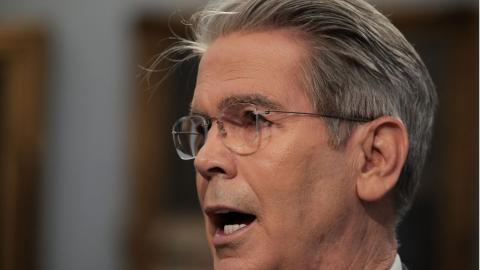
President Trump's aggressive tariff policy, launched early April and dubbed "Liberation Day," imposed a baseline 10% tariff on all imports, with rates reaching as high as 145% on goods from China.
Although the administration paused the steepest tariffs for 90 days to allow room for trade negotiations, many companies, including Walmart, have said that the tariffs would still drive up retail prices. Trump has repeatedly claimed that foreign countries—not U.S. consumers—pay the tariffs, a stance economists overwhelmingly dispute.
On May 18, during an appearance on CNN's "State of the Union," Bessent stated he had spoken directly with Walmart CEO Doug McMillon about the company's pricing strategy amid the tariff hikes. McMillon had warned during a recent earnings call that the company would struggle to absorb the cost increases, especially given Walmart's narrow profit margins.
asked about Walmart saying it's raising prices, Bessent acknowledges of the cost of tariffs that "some may get passed on to consumers" pic.twitter.com/zIQuU6LDQA
— Aaron Rupar (@atrupar) May 18, 2025
Bessent downplayed the warning as a "draconian" earnings call scenario, insisting that while Walmart will bear some costs, consumers will likely face price increases at checkout as well. He emphasized that lowering inflation overall remains a goal, citing recent drops in service and gas prices.
"So Walmart will be absorbing some of the tariffs. Some may get passed on to consumers," he said.
The mixed message from the administration—Trump urging Walmart to "eat the tariffs" while his Treasury secretary concedes consumers will pay more—has raised concerns about the long-term effects on inflation and consumer confidence. Walmart's chief financial officer projected that customers would feel the biggest impact in June.
Meanwhile, small businesses and middle-class families who rely on low-cost imported goods are bracing for higher expenses.
© 2025 Latin Times. All rights reserved. Do not reproduce without permission.




